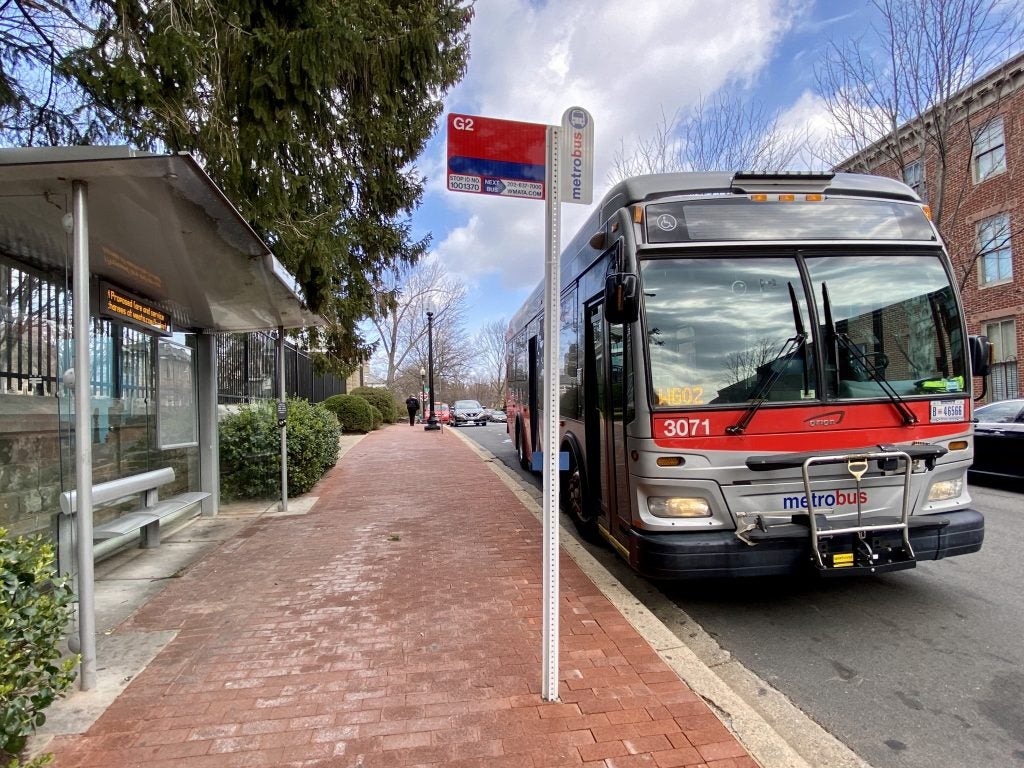Act Now: Save the G2 Bus for Georgetown Campus Workers!

Posted in Immigration and Labor Project Programs | Tagged Action Alert, Campus Workers, Georgetown University, Public transportation, Transit Justice, WMATA
WMATA plans to eliminate the G2 bus and replace it with a D2 bus that picks up passengers at the intersection of 34th and Q Streets. Act now by telling WMATA to preserve the G2 bus that Georgetown workers and so many in our campus community depend on. The deadline to submit comment is Monday, March 9 at 9am.
In its proposed budget for next fiscal year, the Washington Metropolitan Area Transit Authority (WMATA) has put forward significant Metrobus service cuts that would adversely impact the Georgetown University community, especially its many hard-working campus employees.
The proposed changes would consolidate the G2 and D2 buses and eliminate the bus stop at Georgetown’s Front Gates on the intersection of 37th and O Streets. As a result, members of our campus community would have to walk six more blocks – an additional half a mile – to reach their nearest access point to public transit. The proposed changes would also eliminate the D1, 30N, and 30S bus routes altogether, cutting off important bus routes to neighborhoods like Glover Park, Friendship Heights, and Tenleytown.
As D.C.’s largest private sector employer, Georgetown has hundreds of faculty, staff members, and students who rely on the G2 for their daily commutes. In many cases, they have chosen where to live or where to work based on this bus route.
But the group that would be most impacted by the proposed cuts are the workers who sustain Georgetown’s campus. These workers include custodians who work the overnight shift; facilities and maintenance staff; 24-hour security guards; dining hall cooks and cleaners; hotel and food court employees; and hospital housekeepers. They are largely immigrants and overwhelmingly people of color. A great majority of them don’t live in DC proper, but rather in the suburbs of Virginia and Maryland: in places like Arlington, Falls Church, and Springfield; and in Silver Spring, Bladensburg, and Hyattsville. KI estimates that about a quarter of Georgetown’s campus workers use the G2 to get to-and-from campus.
Those workers have a much different commute than most of us. They typically leave their homes at the crack of dawn or late in the evening when most of us are going to sleep. If they don’t happen to live very close to a Metro station, they walk, drive, or take a bus to the nearest station, then wait for and ride the train into the city. Most have to switch lines at least once, before getting off to walk to the MetroBus that will then transport them to Georgetown for their shift. On a good day, when everything runs smoothly, the commute takes between an hour and an hour and a half. On a bad day, it takes much longer.
The proposed changes to the G2 route may seem small to some of us, but to them it would add a ten-minute walk each way to what is already an Odyssean journey home for these workers. It would mean walking an additional six blocks before-and-after a physically demanding work shift. It would mean waiting for a bus on a dark street corner without as much as a bus stop canopy to protect them from the elements. It would mean walking late at night through streets that have seen a large number of assaults and robberies. And – due to increased crowding and more exposure to traffic – it would mean a much greater likelihood that the bus they are waiting for is severely delayed or too full to take them in.
KI believes that decisions should be made based on how they impact the most vulnerable among us. To that end we call on WMATA to reconsider its proposed service cuts in our community and across the DMV area. We also believe in and will continue to work for a transit system that is controlled by the public, environmentally sustainable, just towards transit workers, and affordable – or ideally, free – for all working families.
Make your voice heard by submitting a public comment to WMATA through their brief survey in opposition to service cuts for the G2 and other buses. Comments are due by Monday, March 9 at 9am.
